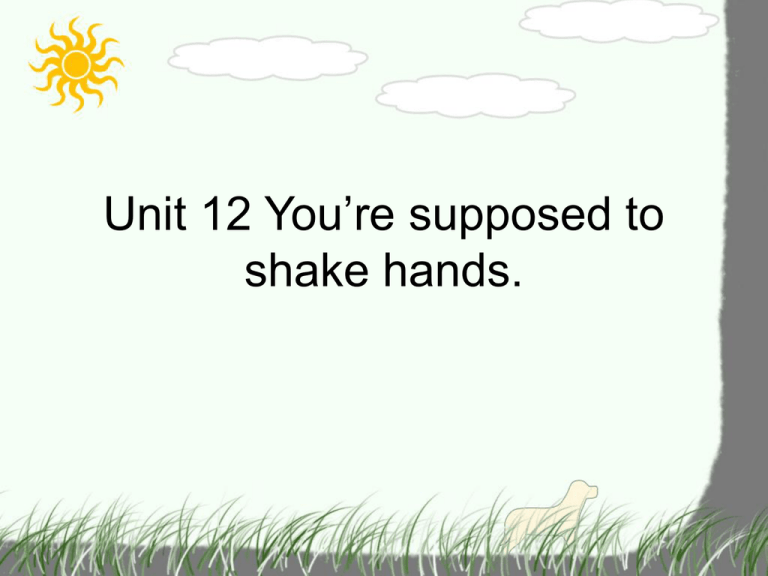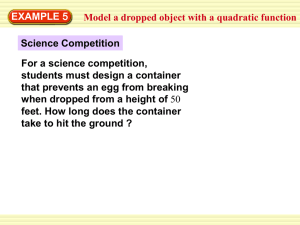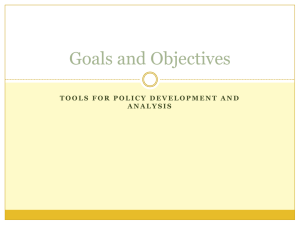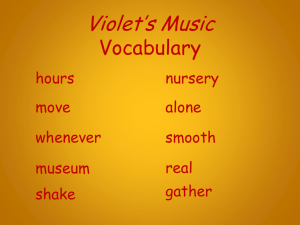UploadFiles/file/人教版英语初三unit12课件
advertisement

Unit 12 You’re supposed to shake hands. 教学目标 重点词与短语 课文解析与翻译 本单元语法 习题 重点词与短语 shake • v. 摇动,震动 • 表达“与某人握手”可以说:shake hands with, shake one's hand,shake somebody by the hand。shake还可以表示“摇晃;颤抖”。 • Shake the bottle before taking the medicine. • 服药前先将药瓶摇一摇。 • The little girl is shaking with cold. • 这个小女孩冻得发抖。 drop • vi. • 1.丢下,掉下,落下: • The apple dropped from the tree to the ground. 苹果从树上掉到地上。 • The flowers are beginning to drop. 花儿开 始凋落了。 • The ball dropped out of his hand. 球从他手 里掉了下来。 • • • • • 2.减少,下降,下跌,减弱: Prices dropped. 物价下跌了。 The wind has dropped. 风势已减弱了。 Her face dropped. 她的脸沉了下来。 His voice dropped to a whisper. 他放低声 音讲话。 • vt. • 1.使掉下,使落下: • Mary dropped the vase on the floor. 玛丽失手把花瓶掉在 地板上。 • In doing so they’re lifting a rock only to drop it on their own feet. 他们这样做是搬起石头砸自己的脚。 • 2.丢下,放弃: • You must drop smoking (the bad habit). 你必须戒烟(戒除 这个坏习惯)。 • Better drop the idea. 最好打消这个想法。 • I dropped law and switched to medicine. 我放弃法律转 学医学。 • 3.使下车:Drop me at the corner. 让我在拐角处下车。 • drop in 探望,串门: • Please drop in to see us if you are in Bradford. 如果你到布拉福特,请顺便来看 看我们。 • We’ll drop over this evening. 我们今晚来。 • My sister dropped around last night. 昨晚 我姐姐顺便来看了我。 • drop off • (1)打瞌睡: • I dropped off and missed the end of the film. 我 打了个瞌睡,把影片的结尾给错过了。 • (2)减少,下降,散去: • Flowers are dropping off. 花朵在凋落。 • His friends dropped off one by one. 他的朋友一 个一个地走了。 • drop sb. a line 给某人写封短信: • Drop me a line to say when you’re coming. 给我 写封短信告诉我你来的时间。 • drop in(顺便拜访)是不及物动词短语,其后 不能接宾语。若语义上需要接宾语,根据 情况可用on(针对人)或at(针对地方): • She dropped in at his office. 她去了他办公 室找他。 • I thought I’d drop in on you while I was passing. 我曾想路过时就来看看你。 drop/fall • 1)表示从高处往下掉或降,两者有时可互换: • The temperature has dropped [fallen]. 气温降低 了。 • (2) fall表示“落下”,多指无意识的行为,有自 然坠落之意,且通常是不及物动词;drop 既可指 无意的行为,即表示“落下”(不及物),也可指 有意的行为,即表示“投下”(及物),如下例就 不宜用fall: • He dropped the letter into the mail-box. 他把信投 入信箱。 towards • • • • • • • prep. 1. 向,朝;面对 I saw her walking towards the bank. 我看到她朝银行走去。 Jean moved towards the door. 琼向门口走过去。 2. 将近;大约 She is towards sixty. 她将近六十了。 We were through with the work towards noon. 将近中午 时我们把工作做完了。 • As we got towards Chicago traffic became heavier. 当我 们快到芝加哥的时候,路上的交通变得更加拥挤。 Towards the end of the term two or three boys caught scarlet fever. 快到学期结束的时候,有两三个男孩子得了猩红热。 • • • • • 3. 对于;关于 What is your attitude towards the question? 你对这个问题的态度如何? 4. 为;有助于;用于 The two parties are working towards a solution. • 双方正努力达成一个解决方案。 point • 1)point可作及物和不及物动词,常用于下列短 语。 • (1)point out意为“指出,使注意”,后面可接 名词,也可接从句作宾语。 • ①The teacher pointed out the mistakes in the composition. 老师指出了这篇作文中的错误。 ②He pointed out that it was important to remove weeds before sowing seed in the soil.他指出在 土壤里播种以前先除草的重要性。 • 1 ) point out that …… • He pointed out that it was important to remove weeds before sowing seed in the soil . • 他指出,播种前清除杂草是很重要的。 • At the meeting , he pointed out that agriculture should be put at the first place . • 2 ) point …… out 或 point out …指出 ( 某人或某 事) • He quickly pointed out a mistake . • Can you point out the finest pictures to me ? = Can you point me out the finest pictures ? • point to意为“指向”,强调方向,并不是 指着该物体。而 point at 表示“指着某一物 体,指人时一般表示粗鲁或不礼貌”。 • ①He pointed to the door and there I saw a girl smiling at me. 他指向门,我发现那 里有一位姑娘朝我微笑着。 • ②The teacher pointed at the map and told me where Britain was. 老师指着地图告诉 我英国的位置。 • point作名词时,有以下几种含义。 • ①Please pay attention to the study of the language points in each unit请注意每一单元中语 言重点的学习。 • ②I failed to catch his point of view. 我没能领会 他的观点。 • ③You‘ve missed the point of the joke. 你没听 出那个笑话的可笑之处。 • ④His talk is short but quite to the point. 他的发 言简洁切题。 form • n. • 形状;外貌;形体 • She has a tall graceful form. 她有着高大优雅的 外形。 • 方式;制度 • Different countries have different forms of government. 不同的国家有不同的政治制度。 • 表格 • If you fill in this form, you can take books out of the library. 如果你填了这张表,就可以把书带出 图书馆。 • v. • 形成;产生 • A plan began to form in his mind. 计划在他 脑子里形成。 • One of the most important task for a school is to help and promote to form a child's character. • 学校的一个重要任务就是要帮助和促进儿 童个性的形成。 • • • • 组织;成立 forming a club 组织一个俱乐部 The president asked the Social Democratic Party to form a new government. • 总统请社会民主党组织新政府。 except---besides 除…之外 • • • • ① except(整体减一)-----besides(整体加一) ②except---expect期待,期盼 词组:expect sb. to do期待某人做…. 复习:beside在….旁边-----besides除….之外 Expect(v) 1. 期待 2. 期盼 expect Expert(n) 专家 expert except 课文解析与翻译 • Where I’m from, we’re pretty relaxed about time. If you tell a friend you’re going to their house for dinner, it’s okay if you arrive a bit late. Spending time with family and friends is very important to us. We often just drop by our friends’ homes. We don’t usually have to make plans to meet our friends. Often we just walk around the town center, seeing as many of our friends as we can! • In Switzerland, it’s very important to be on time. We’re the land of watches after all! If someone invites you to meet them at 4:00, you have to be there at 4:00. If you’re even fifteen minutes late, your friend may get angry. Also, we never visit a friend’s house without calling first. We usually make plans to see friends. We usually plan to do something interesting, or go somewhere together. • 在我们那儿,人们对时间要求不严格。如 果你告诉你的朋友我要去他们家用晚餐, 迟到一点没关系。花时间陪家人和朋友对 我们来说很重要。我们只是顺便拜访我们 的朋友,一般用不着提前计划好。通常我 们在市中心散步,就能尽可能多地见到我 们的朋友! • 在瑞士,守时很重要。毕竟我们是钟表之 国!如果有人邀请你4点去见他们,你就得 4点到。如果即使你迟到15分钟,你的朋友 就会生气。还有,我们从不事先不打招呼 就去拜访朋友。我们通常会计划一起去做 一些有趣的事或者去一些有趣的地方。 • • Dear Laura, Thanks for your message. Yes, I’m having a great time on my exchange program in France. It’s even better than I thought it would be. I was a bit nervous before I arrived here, but there was no reason to be. My host family is really nice. They go out of their way to make me feel at home. And you wouldn’t believe how quickly my French has improved! I’m very comfortable speaking French now. Although I still make lots of mistakes, it doesn’t bother me like it used to. My biggest challenge is learning how to behave at the dinner table. As you can imagine, things are really different from the way they are at home. For example, you’re not supposed to put your bread on your plate. You’re supposed to put it on the table! I thought that was pretty strange at first, but now I’m used to it. You’re not supposed to eat anything with your hands except bread, not even fruit! ( You have to cut it up and eat it with a fork..) Another thing is that it is very rude to say you’re full. If you don’t want any more food, you should just say, “It was delicious.” Also, it’s rude to put your hands in your lap. You should always keep your hands, but not your elbows on the table. I have to say, I find it difficult to remember everything, but I’m gradually getting used to things, and don’t find them so strange any more. I’ll write soon and tell you more about life in France. Hope you’re having a good school year. • 亲爱的劳拉:谢谢你的信息。是的,我在法国的交换项目中过得很 愉快。甚至比我原来想象得要好。我来到这里之前有一点紧张,但其 实没有理由这样。我的寄宿家庭非常好。他们不怕麻烦地让我感觉到 在家一样。而且,我一定不相信我的法语进步有多快!我现在可以可 以轻松地说法语。虽然我仍然会犯很多错误,可它不像过去那样困扰 我了。我最大的挑战是学习吃饭时的礼仪。正如你所想象的那样,在 这里很多地方和在家时不一样。例如,你不应该将面包放在你的盘子 里。你应该将它放在桌上!我原先也认为这很奇怪,但现在我已经习 惯这样了。除了吃面包以外你不应该用手拿任何东西,包括水果!( 你得将它切开然后用叉子吃),另外你说吃饱了那是很不礼貌的。如 果你不想再吃东西了,你应该说“味道真好”。还有,将你的手放在膝 盖上也是很不礼貌的。你应该直接将你的手,而不是肘部放在桌上。 我不得不说,我觉得要记住所有事情很难,但我逐渐地习惯了这些事 情,不再觉得奇怪了。我过些时候再给我写信,告诉你更多关于法国 的生活。希望你在学校的日子过得愉快。 1、王昆到法国之前为什么 会觉得紧张?2、为什么她觉得没有理由紧张呢?3、她的法语提高到 什么程度了?4、刀子正面对的一个特殊的挑战是什么?5、她有什么 觉得惊讶的地方? You are supposed to write quickly! • Can you write in English? And can you also write e-mail English? Maybe not. E-mail English is a new kind of written English that is being used to save time. • A lot of e-mail English words might look unfamiliar to us- many look like rubbish! This is because they come from a computer program called ICQ, which means I seek you. ICQ is an e-mail “ chatline ” that people use to have online conversations with friends. One Canadian teacher says, “ People can use their computers to talk to each other. But you are supposed to type quickly so the other person doesn’t get bored, so using e-mail English helps you write quickly.” • E-mail English mostly uses two types of word. The first are “ abbreviations”. These are formed by using the first letter of each word in the phrase. For example, BTW means “ by the way”, and CSL means “ can’t stop laughing”. The second kind of word is a “ homophone”- it’s created by combining letters and symbols, or numbers, to sound like other words. An example of this would be to write “ great” as “ gr8”, or to write” see you later” as “CUI8r”. • When you write e-mail English you do not need to use punctuation marks only in the traditional way. You are also supposed to use them to show the emotion you are feeling. These are called “ emoticons”. The advantage of using punctuation marks is that you can make faces with them. The most common one is the happy face- it looks like this :) and it is made with a colon and a right bracket beside it. • E-mail English is fun—it’s almost like writing riddles. You can learn it easily by yourselves, and experiment with your own ideas. It is not rude to write e-mail English, but it is important to use it only at the proper time—when you are emailing a friend, or sending a message to a friend on a mobile phone. But you shouldn’t use it in class, and remember your teachers will not be pleased if you write e-mail English in a test! • 你会用英语写作吗?你会用电子邮件英语吗?或 许不会。电子邮件英语是一种用于节省时间的新 的书面英语写作方式。 • 许多电子邮件英语中用的单词看上去可能是新奇 的——许多像是在胡言乱语!这是因为他们来自 于一个叫ICQ的电脑程序,它的意思是“我寻找你” ,ICQ是人们用来与朋友网上交谈的聊天热线。 一位加拿大老师说:人们可以利用电脑与别人交 谈。但你要打字快些才能使对方不感到厌倦。因 此电子邮件英语可以帮助你写得更快。 • 电子邮件英语大多数用两种类型的文字。 第一种是“缩略词”。它是由词组中每个单词 的首字母组成。例如,BTW意为“顺便说”, CSL意为“止不住大笑”。第二种是“同音词” 。它是由字母符号、数字组成的,听起来 像别的单词。例如,“great”可以写成“gr8” ,“see you later”可以写成“CUL8r”。 • 当你写英文电子邮件时你不需要按传统方 式使用标点。你也可以用来表达你的感情 。它们被叫做“情感符号”。用标点的优点是 你可以用它们来做鬼脸。最常见的是笑脸--它看起来像这样:),它由一个冒号和它 旁边的一个右括弧组成。 • 电子邮件英语很有趣的,它几乎像是写谜 语。你能自己轻松地掌握它并尝试你自己 的想法。写电子邮件英语并非不无礼,但 重要的是只能在合适的时间去写-----当你给 朋友发邮件或用手机给朋友发短信时。但 你不能在课堂上用,并且要记住如果你在 考试中写电子邮件英语,你的老师会不高 兴的。 本单元语法 be supposed to Be supposed to • 1)表示“应该,被期望”。 • What are you supposed to do when you meet someone? • 当你遇到某人的时候应该怎么做? • 2)用于否定句中可表示“获准”。 • You are not supposed to smoke on the bus. • 你不可以在公共汽车上抽烟。 • 3)be supposed to的主语是物时,它表示“本应、 本该”,表示“某事本应该发生而没有发生”。 • The plane was supposed to arrive at 6:00.飞机 本应6点钟到。 • 4)be supposed to+ have done表示“本应做某事 而没做”。 • You are supposed to have finished the work so far.到目前为止你们本应早已完成此项工作。 本单元习题 • 1. _________useful work they have done! • A.What B.How C.What a D.What an • 2. His school backpack_________ by a woman ten minutes ago. • A.took awayB.was taken awayC.were take awayD.had taken away • 3 .He_________ in his English Test Paper. His teacher was very angry with him. • A. makes some mistakesB. make a mistake • C. made few mistakesD. made many mistakes • 4. The first thing is_________ the teacher. • A.greeting B.to greet C.greeted D.being greeted • 5. We never visit a friend’s house without________ • A.call B.to callC.calling D.calls • 6. She’s having a great time_________ her exchange program in Australia. • A. on B. inC. with D. about • 7. You wouldn’t believe_________ my English_________ ! • A. how quickly, has improvedB. what quickly, is improved • C. how quick, has improved D. how quickly, is improved • 8. They go out their way to make me_________ at home. • A. for, feel B. of, to feelC. to, feels D. of, feel • 9. We Chinese have got used_________ with forks. • A. to eat B. for eating C. eating D. to eating • C. supposed,shake handD. suppose,shook hands






